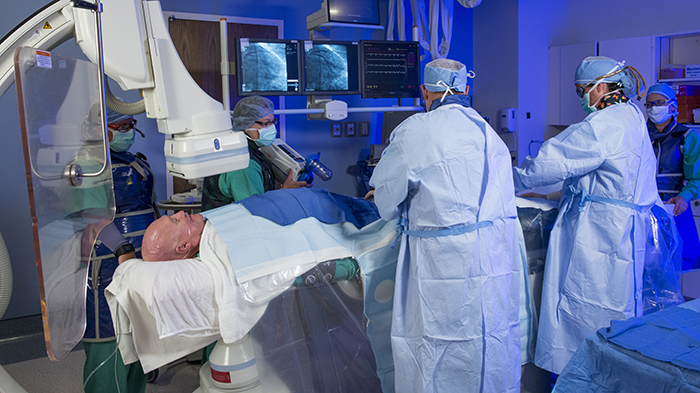Although we are still learning a lot about how people with heart disease are affected by COVID-19, one connection is clear. The pandemic is changing how people without symptoms of COVID-19 are seeking care for other health problems they may be experiencing.
“We continue to care for patients who need our help and we are still performing necessary procedures,” says D.P. Suresh, MD, Cardiologist and Medical Director, St. Elizabeth Heart & Vascular. “What people need to know is that if you need intervention to prevent or stabilize health conditions, we are here for you.”
Hospitals across the country are seeing fewer patients having heart events or heart attacks than before the pandemic. Since heart events can be caused by stress, depression and anxiety, it would seem hospitals should be having an increase.
“We believe that people may be reluctant to come to a hospital in fear of COVID-19 infections,” says Dr. Suresh. “But not getting the care you need is actually a bigger risk.”
An article in the New York Times on April 6, 2020, said that doctors from Hong Kong reported an increase in patients coming to the hospital late in the course of their heart attack, when treatment is less likely to be lifesaving.
It is important if you are having symptoms of a heart attack that you call 9-1-1 or talk to your doctor immediately. At St. Elizabeth, we know safety is on your mind. We are taking steps to make sure our hospitals are safe for anyone who needs to come in for treatment. We want you to be safe and get the care you need—when you need it.
Reduce Your Risk for a Heart Attack
A pandemic can certainly be stressful. Stress and anxiety can be triggers for heart attack and stroke. So, during this time, reduce stress with exercise and better sleep. Limit your exposure to social media and the news. Even consider meditation. And find things to laugh about – laughing is proven stress reducer.
COVID-19 Places Heart Patients at Higher Risk
COVID-19 is believed to have an effect on your heart.
“We know that respiratory infections typically increase the risk of heart attacks,” says Dr. Suresh. “We need anyone with a heart condition to take the social distancing and isolation recommendations very seriously.”
A study in the July 2011 Circulation journal suggests that respiratory infections can double the risk of a heart attack or stroke. The risk is highest soon after the respiratory infection develops.
Anyone with a heart condition should be especially careful in following these recommendations:
- Stay home
- Wash hands often
- Avoid touching eyes, nose and mouth
- Clean and disinfect surfaces
If you have heart symptoms such as chest pain or shortness of breath, never ignore them. Delaying treatment could mean having a life-threatening heart attack.
“Yes, we are working to keep people out of the hospital,” says Dr. Suresh. “But not the people who need to be there. We can safely provide care for patients who don’t have COVID-19.”
Call the St. Elizabeth Heart & Vascular office if you have concerns about symptoms and you can be seen in person or through a new online video visit. Do not avoid care for life-threatening, treatable conditions like heart attacks and strokes.
For updates and the latest information, go to stelizabeth.com/covid-19. And if you think you could be having a heart attack, please call 9-1-1 immediately. For more information on comprehensive cardiac services or be connected with a cardiologist at the St. Elizabeth, please call (859) 287-3045.

